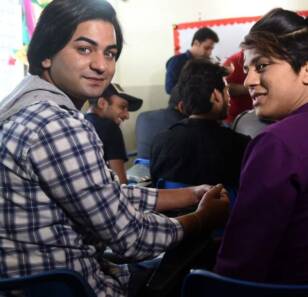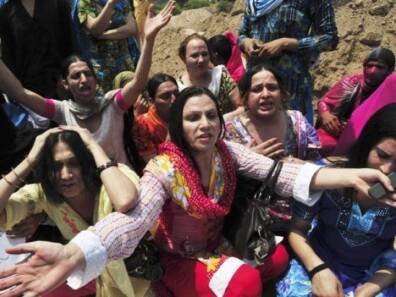Disclaimer*: The articles shared under 'Your Voice' section are sent to us by contributors and we neither confirm nor deny the authenticity of any facts stated below. Parhlo will not be liable for any false, inaccurate, inappropriate or incomplete information presented on the website. Read our disclaimer.
This story has been submitted by Anas Kamal Pasha.
The year 2020 changed a lot of things, specifically March 2020 made us familiar with a variety of new concepts. One of them being social distancing. Such an unorthodox concept bewildered people.
[adinserter block= “3”]
Naturally, human beings are social animals. To be deprived of that social liberty is as if being deprived of oxygen. While the world was in lockdown and observing social distancing, transgenders in Pakistan were already familiar with the concept. They had been observing social distancing all their lives.
Pakistan’s transgender community
According to a 2017 census report, over 10,000 transgenders live in Pakistan, while 64.4% of them live in Punjab. Some 7,651 people categorized as transgenders lived in urban areas, while 2,767 lived in villages or rural areas. Khakhawaja sara or hijras is the umbrella term to describe them.

However, trans activists preach to use the term khawaja sara as this is politically correct. Trans babies or children are usually brought to a guru (the leader of a trans community). Families of such children want gurus to look after them.
The transgender people are already the most marginalized community in Pakistan. They have no real chances at employment. And, even if they want to do business, it’s likely that nobody would be willing to trade with them. As a result, they have to indulge in either begging, dancing, or becoming sex workers.
Their social life is also limited to their own community as well. The stereotype behind the word hijras has made it almost impossible for the transgenders to live morally as Pakistanis.
You’d be surprised that Pakistan was one of the first countries in the world to recognize the ‘Third sex’ in 2009. It also started issuing trans people passports from 2017, while many trans people have also had a run in elections.
They can vote, marry, be buried in cemeteries, and pretty much possess all the rights belonging to a Pakistani citizen. Despite everything, they are still tortured, harassed, raped, bullied, unemployed, detested, and killed.
It seems that giving them equal constitutional and religious rights has not made them acceptable to the Pakistani society. There still exists a mindset that sees them as god’s mistake instead of one of its unique and beautiful creations.
[adinserter block= “10”]
COVID-19 & transgender community
Coming back to the pandemic. During the lockdown, we have come to realize the importance of a lot of things that we may have taken for granted at some point. Forced isolation has given us to reflect on a tons of things, one of them being how blessed we are to freely move, to go wherever we choose to.
However it also made me realize how the most marginalized community in Pakistan feels 24/7 and 364 days a year! How, I would feel staying at my home most of the time in fear not of the virus but of the many ways my day could be ruined by my fellow Pakistani’s.

It’s ironic how it took a global catastrophe for me to realize what social isolation really means and how one community has been living this nightmare since quite a long time but better late than never right? It’s delightful to see a student run organization; Actcept working for the right and inclusion of transgender in our society.
They invite powerful Tran’s personalities to events inside universities and ask them for speak and raise awareness regarding the trans people of Pakistan.
This helps the younger and upcoming generations get a different perspective on trans people. Presence of Tran’s personalities inside of universities and colleges provides a different setting, one that is far away from traffic signals where we usually find trans people.
[adinserter block= “4”]
The purpose of this writing is not to incite any political or policy change for the trans people. This writing has a more rudimentary approach of just accepting the trans people, just passing them a smile instead of a snare, just asking them how they are, and just consider them as human beings instead of the monsters we paint them to be. Just a silver lining of this empathetic pandemic.
What do you think of this story? Let us know in the comments section below.







